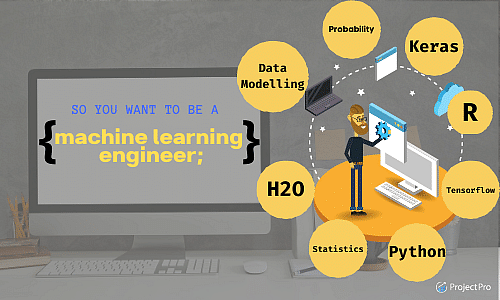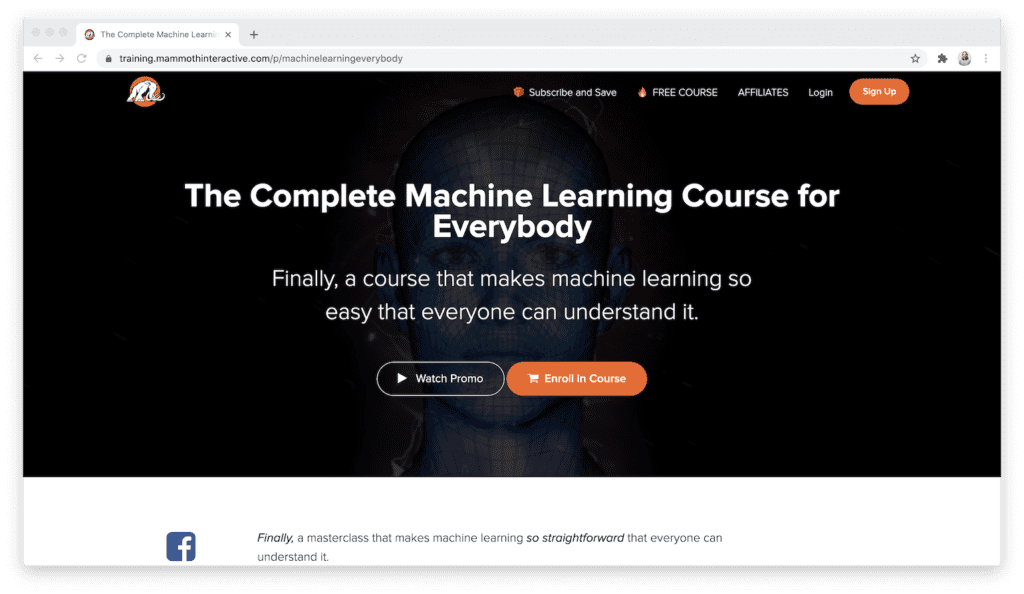All Categories
Featured
Table of Contents
- – Some Ideas on Software Engineering Vs Machine ...
- – What Does How To Become A Machine Learning Eng...
- – How To Become A Machine Learning Engineer - T...
- – Not known Facts About Machine Learning Applie...
- – The Definitive Guide to Machine Learning Is ...
- – The Buzz on Ai And Machine Learning Courses
- – The Interview Kickstart Launches Best New Ml...
Some people assume that that's unfaithful. If someone else did it, I'm going to use what that person did. I'm compeling myself to think with the feasible solutions.
Dig a little bit deeper in the math at the start, simply so I can develop that structure. Santiago: Lastly, lesson number seven. This is a quote. It claims "You have to recognize every information of an algorithm if you desire to use it." And after that I state, "I think this is bullshit suggestions." I do not believe that you have to recognize the nuts and bolts of every algorithm before you use it.
I've been making use of neural networks for the lengthiest time. I do have a sense of how the slope descent works. I can not describe it to you today. I would certainly have to go and check back to actually get a far better instinct. That doesn't indicate that I can not resolve things utilizing neural networks? (29:05) Santiago: Trying to compel individuals to believe "Well, you're not going to achieve success unless you can describe every detail of just how this works." It goes back to our arranging example I believe that's simply bullshit advice.
As a designer, I have actually worked on numerous, several systems and I have actually utilized several, many things that I do not comprehend the nuts and bolts of exactly how it functions, even though I comprehend the effect that they have. That's the final lesson on that particular thread. Alexey: The funny thing is when I think about all these libraries like Scikit-Learn the formulas they use inside to apply, as an example, logistic regression or another thing, are not the exact same as the algorithms we examine in artificial intelligence classes.
Some Ideas on Software Engineering Vs Machine Learning (Updated For ... You Should Know
Even if we attempted to find out to obtain all these fundamentals of machine knowing, at the end, the algorithms that these libraries make use of are various. ? (30:22) Santiago: Yeah, definitely. I think we require a great deal a lot more materialism in the sector. Make a great deal more of an impact. Or concentrating on providing value and a bit less of purism.

I normally speak to those that desire to function in the market that desire to have their impact there. I do not attempt to speak concerning that since I do not understand.
Right there outside, in the market, pragmatism goes a long means for certain. Santiago: There you go, yeah. Alexey: It is a great motivational speech.
What Does How To Become A Machine Learning Engineer (With Skills) Do?
One of the points I wanted to ask you. First, let's cover a couple of things. Alexey: Allow's begin with core devices and frameworks that you need to learn to really shift.
I recognize Java. I understand just how to utilize Git. Maybe I recognize Docker.
What are the core tools and structures that I need to find out to do this? (33:10) Santiago: Yeah, definitely. Terrific question. I assume, leading, you must start discovering a little bit of Python. Considering that you currently recognize Java, I don't assume it's mosting likely to be a substantial shift for you.
Not due to the fact that Python is the exact same as Java, but in a week, you're gon na get a whole lot of the distinctions there. Santiago: After that you obtain certain core devices that are going to be made use of throughout your entire job.
How To Become A Machine Learning Engineer - Truths
That's a library on Pandas for information manipulation. And Matplotlib and Seaborn and Plotly. Those 3, or among those 3, for charting and displaying graphics. You obtain SciKit Learn for the collection of equipment knowing formulas. Those are tools that you're mosting likely to need to be making use of. I do not suggest simply going and discovering concerning them out of the blue.
We can discuss certain programs later on. Take one of those courses that are going to begin presenting you to some issues and to some core concepts of artificial intelligence. Santiago: There is a program in Kaggle which is an introduction. I don't keep in mind the name, yet if you most likely to Kaggle, they have tutorials there completely free.
What's great regarding it is that the only requirement for you is to know Python. They're mosting likely to provide a trouble and tell you exactly how to use choice trees to solve that certain issue. I think that process is exceptionally powerful, because you go from no equipment finding out history, to recognizing what the trouble is and why you can not fix it with what you understand today, which is straight software application design practices.
Not known Facts About Machine Learning Applied To Code Development
On the other hand, ML engineers specialize in building and deploying machine learning models. They concentrate on training versions with data to make forecasts or automate tasks. While there is overlap, AI engineers manage more varied AI applications, while ML engineers have a narrower emphasis on artificial intelligence algorithms and their useful implementation.

Machine learning engineers focus on establishing and deploying equipment understanding versions right into manufacturing systems. On the other hand, information scientists have a broader role that includes information collection, cleaning, expedition, and building versions.
As companies progressively embrace AI and device knowing modern technologies, the demand for knowledgeable specialists grows. Equipment learning designers function on cutting-edge projects, contribute to advancement, and have affordable incomes.
ML is basically various from conventional software application advancement as it concentrates on teaching computer systems to gain from information, instead of programming explicit regulations that are executed systematically. Uncertainty of results: You are possibly utilized to creating code with predictable results, whether your function runs when or a thousand times. In ML, nevertheless, the end results are much less specific.

Pre-training and fine-tuning: Exactly how these versions are trained on substantial datasets and afterwards fine-tuned for specific jobs. Applications of LLMs: Such as message generation, belief evaluation and information search and access. Papers like "Focus is All You Required" by Vaswani et al., which introduced transformers. Online tutorials and courses concentrating on NLP and transformers, such as the Hugging Face training course on transformers.
The Definitive Guide to Machine Learning Is Still Too Hard For Software Engineers
The ability to handle codebases, merge modifications, and solve problems is equally as vital in ML advancement as it remains in typical software application tasks. The skills created in debugging and screening software applications are highly transferable. While the context might change from debugging application reasoning to recognizing problems in information processing or design training the underlying concepts of systematic investigation, theory testing, and repetitive refinement are the exact same.
Equipment discovering, at its core, is heavily dependent on statistics and likelihood theory. These are important for recognizing just how formulas find out from data, make forecasts, and assess their efficiency. You should think about ending up being comfortable with ideas like analytical relevance, circulations, theory screening, and Bayesian thinking in order to design and translate designs effectively.
For those curious about LLMs, a comprehensive understanding of deep knowing styles is valuable. This includes not only the mechanics of neural networks yet likewise the design of specific versions for different usage cases, like CNNs (Convolutional Neural Networks) for picture processing and RNNs (Recurring Neural Networks) and transformers for consecutive information and all-natural language processing.
You should be conscious of these problems and discover methods for recognizing, alleviating, and interacting about predisposition in ML versions. This consists of the possible effect of automated decisions and the moral ramifications. Many designs, particularly LLMs, call for considerable computational resources that are typically given by cloud platforms like AWS, Google Cloud, and Azure.
Building these abilities will not only assist in a successful change right into ML yet also make certain that designers can add efficiently and sensibly to the improvement of this vibrant field. Theory is necessary, yet nothing beats hands-on experience. Begin working with jobs that enable you to apply what you've discovered in a sensible context.
Develop your jobs: Beginning with simple applications, such as a chatbot or a message summarization device, and slowly increase intricacy. The area of ML and LLMs is quickly advancing, with new developments and innovations emerging regularly.
The Buzz on Ai And Machine Learning Courses
Contribute to open-source projects or compose blog site posts concerning your knowing trip and jobs. As you gain proficiency, begin looking for possibilities to include ML and LLMs into your work, or seek new functions concentrated on these innovations.

Vectors, matrices, and their role in ML formulas. Terms like model, dataset, attributes, labels, training, reasoning, and recognition. Information collection, preprocessing methods, version training, assessment processes, and release factors to consider.
Decision Trees and Random Woodlands: User-friendly and interpretable models. Assistance Vector Machines: Maximum margin classification. Matching trouble types with suitable versions. Balancing performance and complexity. Fundamental framework of semantic networks: neurons, layers, activation functions. Split calculation and ahead propagation. Feedforward Networks, Convolutional Neural Networks (CNNs), Persistent Neural Networks (RNNs). Picture acknowledgment, series prediction, and time-series analysis.
Continual Integration/Continuous Deployment (CI/CD) for ML operations. Design monitoring, versioning, and efficiency monitoring. Identifying and attending to adjustments in version performance over time.
The Interview Kickstart Launches Best New Ml Engineer Course Statements

You'll be presented to 3 of the most pertinent elements of the AI/ML technique; supervised discovering, neural networks, and deep knowing. You'll comprehend the differences between conventional shows and device discovering by hands-on growth in supervised learning prior to building out complicated dispersed applications with neural networks.
This training course acts as a guide to device lear ... Program Much more.
Table of Contents
- – Some Ideas on Software Engineering Vs Machine ...
- – What Does How To Become A Machine Learning Eng...
- – How To Become A Machine Learning Engineer - T...
- – Not known Facts About Machine Learning Applie...
- – The Definitive Guide to Machine Learning Is ...
- – The Buzz on Ai And Machine Learning Courses
- – The Interview Kickstart Launches Best New Ml...
Latest Posts
Software Developer (Sde) Interview & Placement Guide – How To Stand Out
The Best Strategies For Answering Faang Behavioral Interview Questions
The Easy Way To Prepare For Software Engineering Interviews – A Beginner’s Guide
More
Latest Posts
Software Developer (Sde) Interview & Placement Guide – How To Stand Out
The Best Strategies For Answering Faang Behavioral Interview Questions
The Easy Way To Prepare For Software Engineering Interviews – A Beginner’s Guide